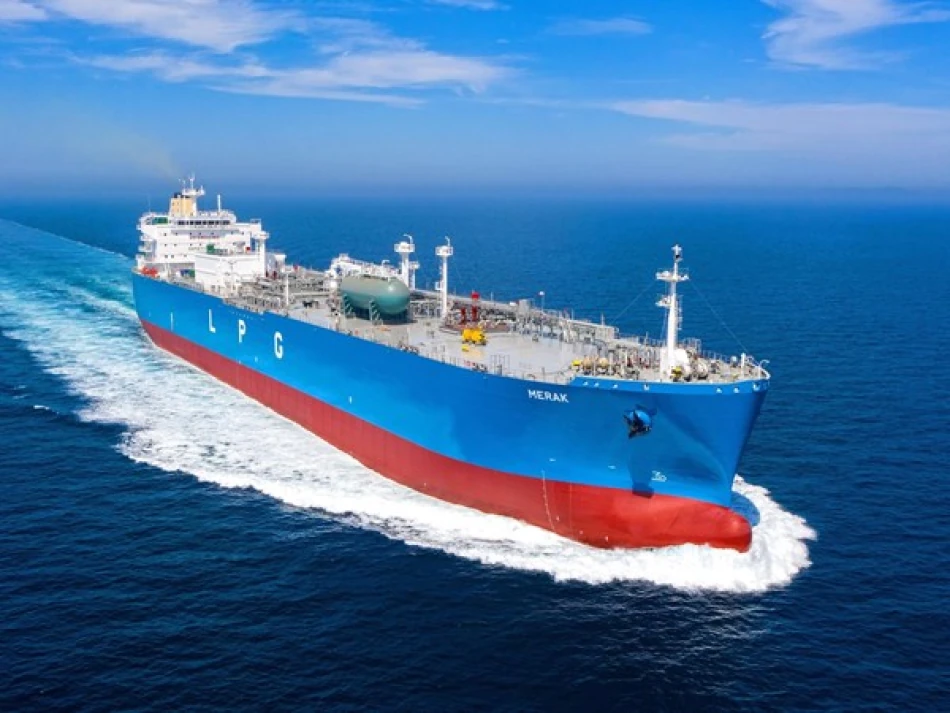
Shipbuilder Saipem and PGN Acquire Third Liquefied Petroleum Gas Carrier 'Mirak'
UAE's Al Seer Marine Expands Fleet with Third Giant LPG Carrier, Eyes Green Fuel Future
Al Seer Marine has taken delivery of "Mirak," an 86,423 cubic meter LPG carrier equipped with ammonia transport capabilities, marking another strategic move in the UAE's push to dominate alternative fuel shipping. The vessel's dual-fuel technology and ammonia readiness position the Dubai-based company at the forefront of the maritime industry's green transition, as global shipping seeks cleaner alternatives to traditional marine fuels.
Strategic Fleet Expansion Amid Energy Transition
The "Mirak," delivered on August 14, 2025, by South Korea's Hyundai Samho Heavy Industries, represents the third vessel in the joint venture between Al Seer Marine Equipment & Supply (part of International Holding Company) and BGN. The carrier immediately embarked on its maiden voyage to the U.S. Gulf Coast to load propane and butane cargo, demonstrating the immediate commercial deployment of new tonnage.
Singapore-based Fleet Management will operate the vessel, highlighting the international nature of modern shipping operations where UAE ownership, Korean construction, and Singaporean management converge to serve global energy markets.
Sharia-Compliant Financing Model
Abu Dhabi Islamic Bank led the financing for "Mirak" and two previously delivered sister ships through Islamic banking facilities. This approach reflects the Gulf region's preference for Sharia-compliant financial structures in major infrastructure investments, offering an alternative to conventional maritime financing dominated by European and Asian banks.
Ammonia: The Next Frontier in Clean Shipping
The vessel's ammonia transport capability positions Al Seer Marine ahead of a potential boom in green ammonia trade. Unlike traditional LPG carriers, ammonia-ready vessels can tap into the emerging market for ammonia as both a hydrogen carrier and a direct marine fuel. This dual capability could prove crucial as the International Maritime Organization pushes for net-zero emissions by 2050.
Major shipping companies like Maersk and CMA CGM have already ordered ammonia-powered vessels, while countries including Japan, South Korea, and Germany are investing heavily in green ammonia production. Al Seer's early positioning in this market could yield significant returns as ammonia trade volumes grow.
Financial Performance Validates Strategy
Al Seer Marine's focus on alternative fuel shipping has delivered impressive financial results. The company reported a 20.2% increase in operating revenue and an 81.7% surge in gross profit for the first half of 2025, according to CEO Jay Nevins. These figures suggest that early investment in dual-fuel and alternative-ready tonnage is paying dividends as charter rates for such vessels command premiums.
The strong performance contrasts with traditional shipping sectors that have faced volatile rates and overcapacity issues. By targeting the energy transition, Al Seer has carved out a profitable niche in a transforming industry.
Completing the Fleet Expansion
Two additional vessels remain on order from the 2023 shipbuilding contracts. A gas/ammonia carrier under construction at Japan's Kawasaki Heavy Industries is scheduled for October 2025 delivery, while another giant LPG carrier from Hyundai Samho will arrive in November 2025.
Upon completion, Al Seer Marine's fleet will reach 16 vessels spanning LPG carriers, crude oil tankers, product tankers, VLCCs, medium-range tankers, and bulk carriers. This diversification provides the company with exposure to multiple energy commodity markets while maintaining focus on the transition to cleaner fuels.
Regional Competition and Global Positioning
Al Seer's expansion mirrors broader Middle Eastern ambitions in shipping and logistics. The UAE competes with Saudi Arabia's growing maritime sector and Qatar's established LNG shipping dominance. However, Al Seer's focus on ammonia and dual-fuel capabilities differentiates it from regional peers who remain more focused on traditional hydrocarbon transport.
BGN CEO Roya Baygan emphasized that the partnership aims to expand ammonia trade operations, suggesting both companies see significant growth potential in this emerging market. As global ammonia production capacity increases, particularly from renewable energy projects, specialized transport capacity will become increasingly valuable.
The timing of Al Seer's fleet expansion coincides with tightening environmental regulations and growing corporate demand for cleaner shipping solutions, positioning the company to benefit from the maritime industry's most significant transformation in decades.
Most Viewed News

 Layla Al Mansoori
Layla Al Mansoori






